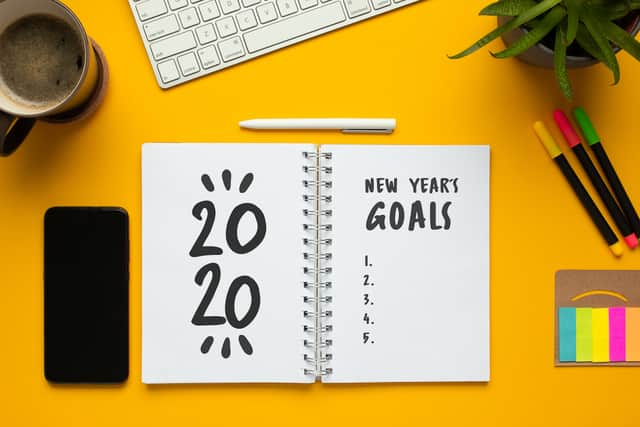How to make sure your New Year’s resolutions stick with these top tips and tricks


With 2019 coming to an end in a matter of days, many of us are beginning to wonder what 2020 has in store.
Traditionally at the start of a new year, lots of us vow to make a change in some way or another with a New Year’s resolution .
Advertisement
Hide AdAdvertisement
Hide AdHowever, following through with these resolutions is something that many of us struggle with.
This is how to make your New Year’s resolutions stick according to clinical psychologist Dr John J Marshall.
Back door changes
“Environmental alterations that supports new action is the key to making changes,” according to Dr Marshall.
For example, if you’re looking to get healthy, you can try shopping for food after you’ve eaten so you’re less likely to indulge in something you shouldn’t, and changing the size of your plate. These are going to be more effective than sudden, massive changes that could cause you to fail.
Advertisement
Hide AdAdvertisement
Hide Ad“Making changes by the back door are more likely to work,” Dr Marshall said.
Visualisation
Dr Marshall said: “Visualisation is proven to increase your odds of successfully reaching your goals.”
Try and repeatedly imagine yourself doing your objective and what the end goal looks like. So if your goal is to take up exercising or quitting smoking, imagine yourself doing these things and think about what looks and feels like.
Dr Marshall also said: “Learn about ‘urge surfing’, when you stop something addictive your urges will rise like a wave, but they also subside.”
One day at a time
Advertisement
Hide AdAdvertisement
Hide AdTaking it one day at a time is key when it comes to making long term changes. You should also seek out support from people undertaking the same changes as you - pair up and work on new goals together.
Dr Marshall says that “co-coping is the way to go” and more you likely to fail to make changes on your own.
Awareness
“Becoming more aware of a problem and making it less automatic can help,” states Dr Marshall.
For example, nail biting - take a note on your phone or a notepad every time you bite your nails. Don’t try and change anything about your behaviour, just work on being more aware of the action.
Advertisement
Hide AdAdvertisement
Hide Ad“Awareness alone starts to shirt habits,” Dr Marshall said. “Then, rather than an ‘eliminate’ goal, go for modifying targets, deliberately bite two fingers rather than five.”
From there moving forward, you can work on eventually reducing the habit enough that you can stop.
Be realistic
Make sure your goals are achievable - lots of people suffer from setting unrealistic expectations when it comes to their resolutions and getting frustrated when they can’t achieve them.
Use failure to your advantage
Another thing that trips up a lot of people is giving up after experiencing one set back.
Advertisement
Hide AdAdvertisement
Hide Ad“See failing as a source of information for learning about what went wrong, then readjust your plans,” Dr Marshall advises.
Identifying what went wrong and altering your methods or expectations will make it easier for you to follow through with your goals.
Dr Marshall said: “If the steps are too big, dice them into smaller steps. Take a goal break if you are struggling and return in a week to a new re-chunked plan.”
Self efficacy
“Psychologists study the concept of self-efficacy, how much do you really believe deep down you can change?” Dr Marshall said. “The change you get is the change you believe in.”
Advertisement
Hide AdAdvertisement
Hide AdWork on your self belief, before doing anything else. Where your self belief may let you down, use a mantra as well to keep you motivated, even if you don’t believe them.
This article originally appeared on our sister site Edinburgh Evening News